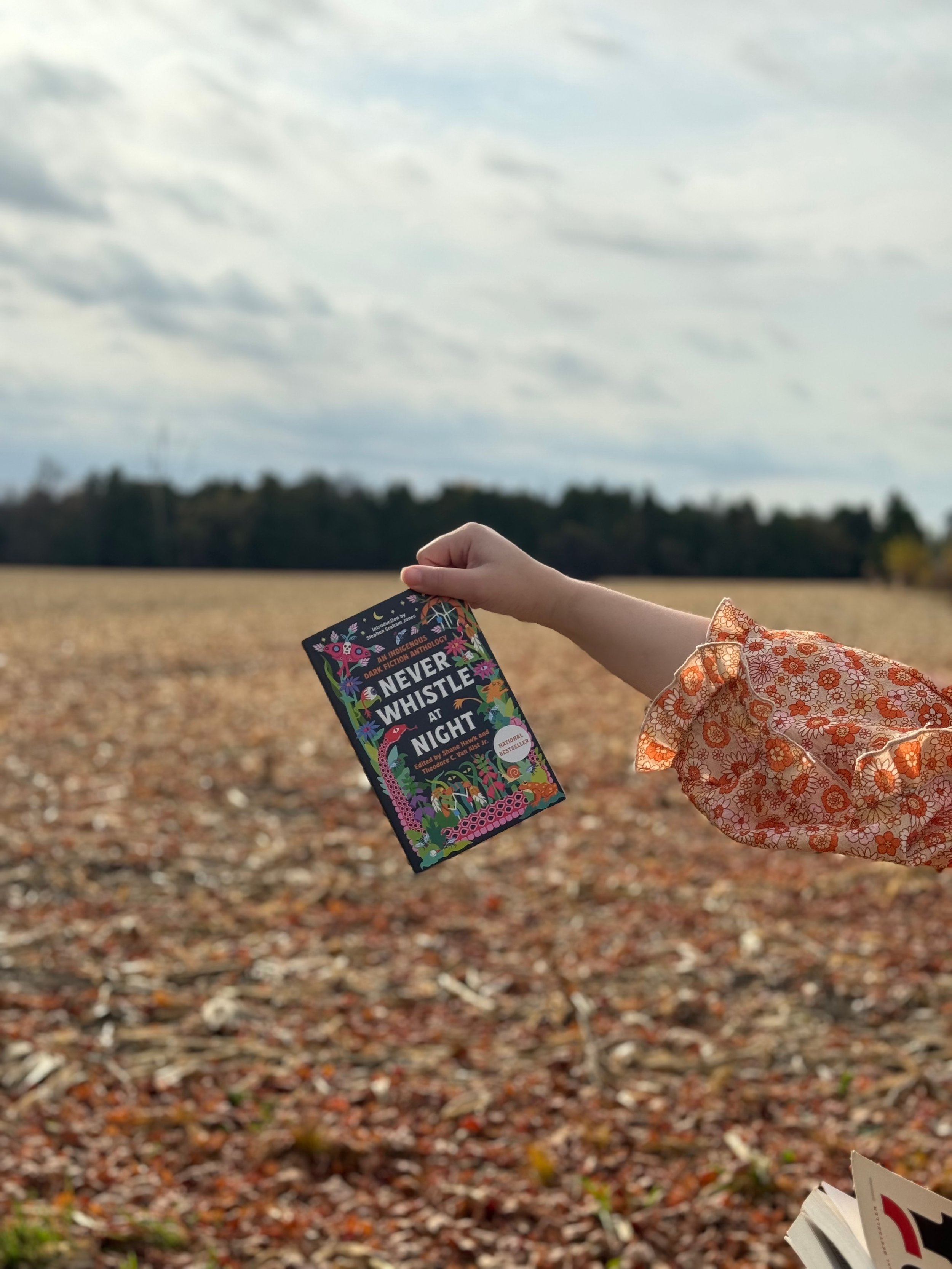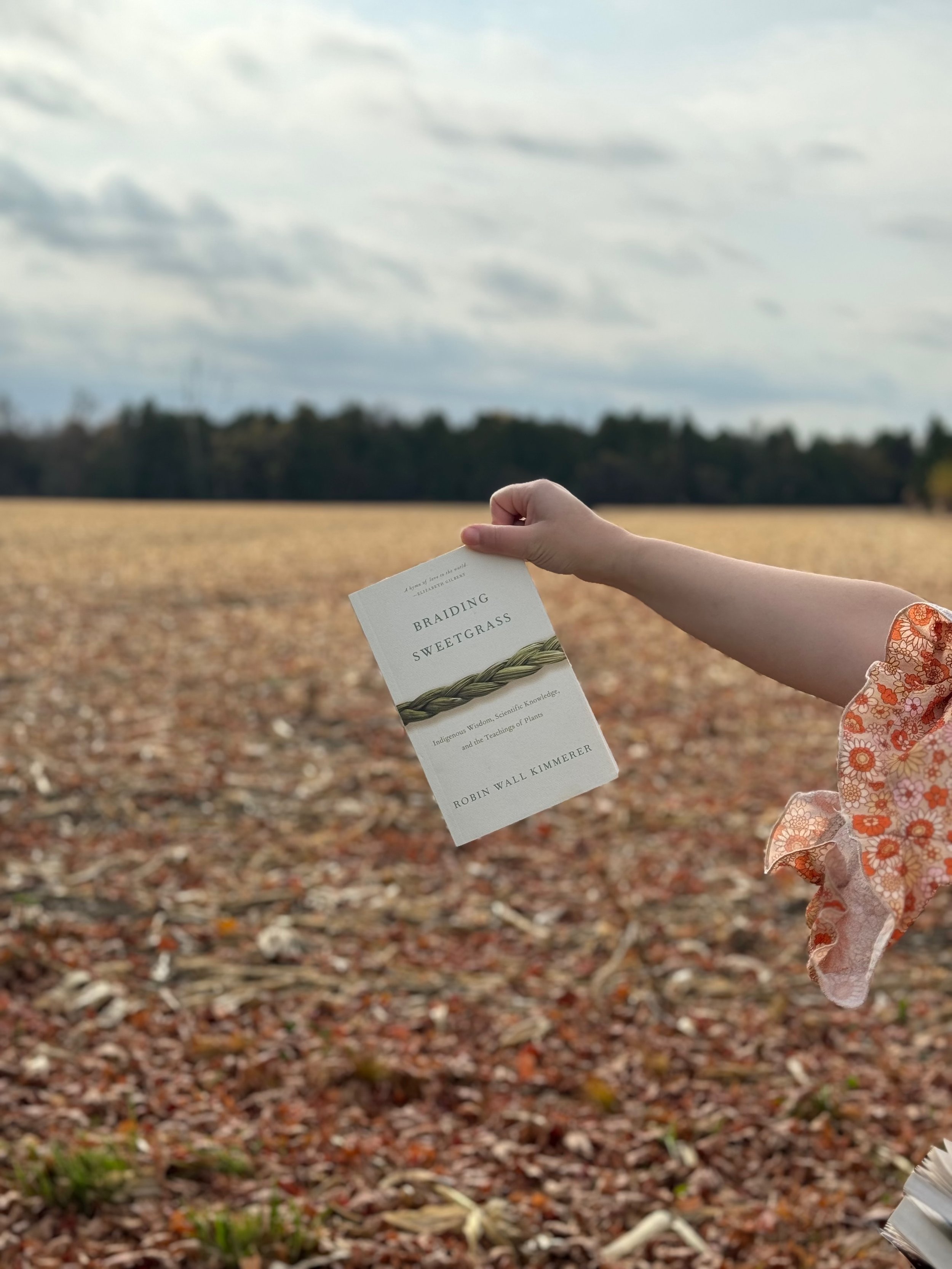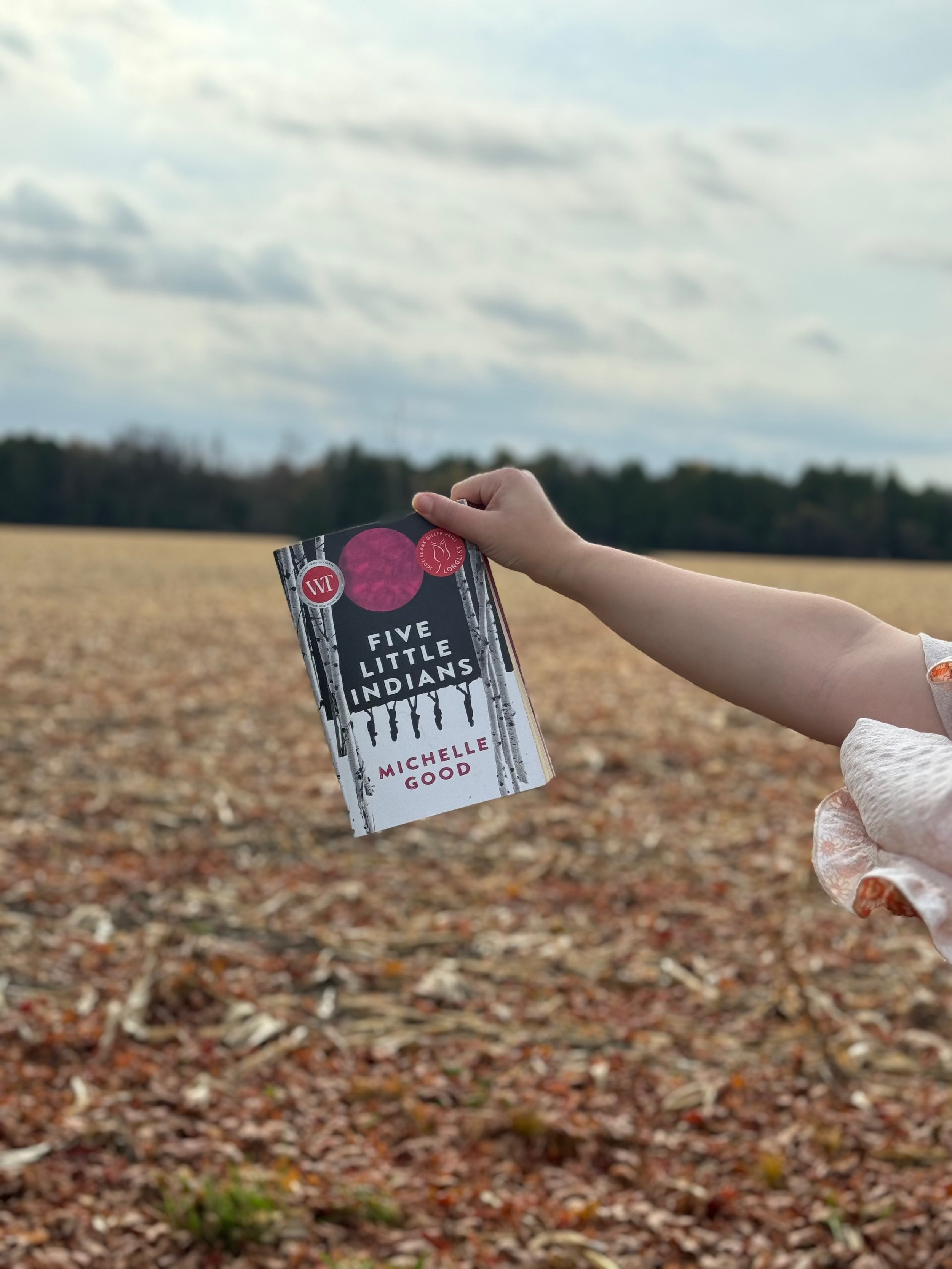Indigenous Author’s You Need on Your TBR
This page may include affiliate links where we receive a small portion of sales from that link.
At PnP, we make it a priority to read POC and marginalized authors. This week, we’re focusing on North American Indigenous authors that we love or are DYING to read.
Heather’s Reads
VenCo by Cherie Demaline
VenCo by Cherie Demaline follows a Métis MC. Somehow, she finds a magic spoon and, of course, she doesn’t know its significance. A powerful adversary comes into play and chaos ensues. It’s full of witches, mysteries, secret groups/societies, mythology, folklore... all the good stuff.
This is a contemporary fantasy with magical realism and horror elements.
Never Whistle at Night—Anthology
Never Whistle at Night is a dark fiction anthology with a wide variety of short stories all written by indigenous authors. If you’re looking to find some new authors or want to feel out a different storytelling style, this is quite literally perfect.
Black Sun by Rebecca Roanhorse
Black Sun by Rebecca Roanhorse is an LGBT+ sci-fi story based around pre-Columbian American society. It’s full of politicking, celestial prophecies, and forbidden magic.
Say less.
Walking on the Clouds—Anthology
Walking on the Clouds is an anthology focusing on sci-fi short stories written by indigenous authors. Another great intro and source to find your next favorite author.
The Break by Katherena Vermette
The Break by Katherena Vermette is a debut novel about a shocking and heart-wrenching tragedy. It follows a Mètis-Anishinaabe family in Winnipeg’s North End.
This book won the Amazon.ca First Novel Award and was a finalist for the Rogers Writers’ Trust Fiction Prize and the Governor General’s Literary Award.
Fire Keeper’s Daughter by Angeline Boulley
Okay, this next one has been given so many prizes and just sounds so good. Fire Keeper’s Daughter by Angeline Boulley is a YA Thriller following eighteen-year-old Daunis Fontaine. She ends up witnessing a murder and is brought into an investigation she wants no part of.
Son of a Trickster by Eden Robinson
Want a YA fantasy novel that is filled with magical realism and North American Indigenous lore woven together in a gorgeous coming-of-age story? Son of a Trickster by Eden Robinson is the book for you. It’s the first in a completed trilogy.
You’re welcome.
Birdie by Tracey Lindberg
Birdie by Tracey Lindberg is described as a “darkly comic and moving” debut novel. It follows Bernice Meetoos as she embarks on something like a vision quest. This just sounds super interesting, as it covers recovering from intergenerational trauma, finding oneself, and women’s struggle.
Moon of the Crusted Snow by Waubegshig Rice
Moon of Crusted Snow by Waubegshig Rice is a dystopian novel that follows a northern Anishinaabe community. Just as winter is looming, their community goes dark. Panic builds, people struggle to maintain order, and then people start arriving from the south.
Kendall’s Indigenous Author Recommendations
When I first got back into reading, my bias toward fiction made me feel like I needed to read with a purpose. Indigenous authors really pulled me back in. I wanted to learn more about Indigenous heritage, especially considering the disparities Indigenous people face compared to the rest of the population. Understanding this treatment—and the impact of it—has been a significant motivator.
Indigenous topics reignited my interest in writing, leading to my first published piece in Might Nature Be Canadian? back in March 2020.
There’s always been a conflict when it comes to “looking Native.” It often doesn’t feel fair to label oneself as Native, even if it's in the blood. Indigenous people come in all shades of human, and those without direct ties to their heritage can struggle with their identity. It’s a complex topic, and it can be difficult to explain the nuances of identity, especially when faced with misconceptions and stereotypes.
Despite these complexities, Indigenous stories have brought me back to reading. I’ve explored a fair amount of this literature and have a strong desire to read more fiction by Indigenous authors. The tales of little people, wendigos, and shape-shifters fascinate me, and I’ve even thought about writing my own stories inspired by these eerie legends.
So, while I know our podcast usually focuses on fiction, my list will include a mix of both fiction and non-fiction. My experiences with reading and life have shaped how I engage with this topic, and I’m excited to share what I’ve discovered.
Braiding Sweetgrass - Robin Wall Kimmerer
We talked about this one on our podcast last year, and I’m really excited to dive back in!
Okay, so I have the physical book, but I listened to the audiobook version, and let me tell you—it’s one you need to take slow. Kimmerer discusses some big ideas, and even though she writes in such a beautiful, powerful way, it definitely takes time to digest everything.
Robin Wall Kimmerer is a phenomenal author, known for Gathering Moss, Braiding Sweetgrass (her most famous work), The Democracy of Species, and The Serviceberry, to name a few. She’s Potawatomi, a mother, a scientist, and a decorated professor who teaches environmental biology. Plus, she’s the founder and director of the Center for Native Peoples and the Environment.
Reading her books is like stepping into her world. She has a way of blending traditional Indigenous thinking with scientific insight, giving you a perspective on the natural world that’s truly unique. Kimmerer has this amazing ability to show how everything is connected, adding depth to the little things we often overlook. It’s definitely a book you’ll want to savor, not just for the knowledge but to really put into practice.
Her writing is magnetic; she brings non-fiction to life in a way that makes it exciting. You’ll find yourself wanting to see the world through her eyes and experience everything as she does. Kimmerer provides an essential look into Indigenous life, illustrating why traditional ways of living still matter today. In a world where many feel disconnected from nature, her work highlights the beauty around us and the importance of reconnecting with it.
21 Things You May Not Know About the Indian Act - Bob Joseph
This book expands on Bob Joseph’s viral article that dives deep into the history of the Indian Act. He expertly educates readers about its ongoing influence in today’s world and how we can work together toward reconciliation.
If you’re eager to start learning about the legal history of Indigenous Peoples, this is a great place to begin. Joseph provides a thorough exploration of this vital legislation, giving you a clear look at how systemic and institutionalized racism is embedded in Canada.
Inspired by this book, I ventured out to the “Maynard” Sam George Library, which holds over 2,000 items relating to Ontario and Canada’s Indigenous communities. While I was there, I snagged my own copy of the original Indian Act—definitely a piece of history worth examining!
Stand Like A Cedar - Nicola L. Campbell (a kids book age 3-5)
Something for the youngster’s too!
This is a fun book that explores how to “stand like a cedar” while journeying through the wilderness. This book shares Indigenous languages and teachings in a way that’s both educational and genuinely interesting for kids.
Bad Cree - Jessica Johns
Jessica Johns’ debut novel is one you won’t want to miss. It’s a supernatural horror featuring magical realism and Indigenous voices!
Now, this is what I’m looking for. An Indigenous author who writes fiction - fantastic! I talked about this a bit in our podcast, but I’m so happy to see more and more Indigenous (and other POC) authors writing fiction! It seems like there’s so much pressure on POC to educate non-POC on their struggles and their experiences, that I feel like we can get drowned out when it comes to writing for creativity.
A young Cree woman, Mackenzie, wakes up from a particularly horrific dream holding a crow’s head. She has vivid memories of fighting off masses of birds - but when she blinks, the head disappears. Dreams merge with reality, and Mackenzie begins to question her reality.
Five Little Indians - Michelle Good
I listened to this one as an audiobook last year, and wow, I have strong feelings about it.
Five Little Indians is Michelle Good’s debut novel, and she did not hold back. The story follows the lives of a few survivors of the Residential School system during Canada’s 60s Scoop.
If you’re unfamiliar with the 60s Scoop or Residential Schools, brace yourself for a difficult but necessary journey. This novel lays bare the disturbing truth behind these systems and the lasting trauma they’ve inflicted on individuals and families.
The deeply emotional stories provide a raw understanding of what really happened and how those responsible were able to get away with it. It’s worth noting that Michelle Good is a 60s Scoop survivor herself, so this story comes from a very personal place. While the characters may be fictional, the experiences and memories woven into this novel are painfully real.
All Our Relations, Tanya Talaga
I saved Tanya Talaga for last for a very special reason I’ll explain below!
All Our Relations is a non-fiction book highlighting youth suicide in Indigenous communities. It features a lot of information on topics such as intergenerational trauma, the long-term effects of colonialism, and the history of systemic racism in Canada towards our Indigenous peoples.
A Little Bit About Tanya Talaga
Tanya Talaga is an Anishinaabe author known for her powerful works, including All Our Relations, Seven Falling Feathers, and her latest release, The Knowing, which just came out in August of 2024.
She worked as a journalist at the Toronto Star for over 20 years, during that time having published her first books, as well as garnering a multitude of awards.
I saved Tanya for last because I had the incredible opportunity to meet her! She held a conference and signing at the club where we worked, and she truly is phenomenal. Her presence reminds me of Robin Wall Kimmerer; she’s well-educated and knowledgeable yet kind and understanding, never accusatory or judgmental. She embodies the spirit of a genuine teacher who genuinely wants to see others succeed.
I will say that her books also read like Wall Kimmerer’s. It takes some time to absorb all the information being shared with you. A lot of that reason is that it’s a heavy topic, and it goes so deep, and branches out so wide that it can feel overwhelming - especially if you’re just starting to learn more about our history regarding Native Americans.
I also want to acknowledge the kindness and generosity of the GM of the club where Heather and I met. He was kind enough to buy me two copies of Tanya’s books so I could meet her and have her sign them. The gesture meant the world to me, especially as it happened during a particularly challenging time in my life. Meeting someone I idolized - who represents me and my aspirations - was truly unforgettable.
As the last person in line at her signing, I could see she was likely exhausted after a long night. While I don’t remember everything we discussed, one piece of advice she gave me has stuck with me for six years: “Never stop learning, and always push forward.” That simple reminder resonates deeply, emphasizing the importance of growth and perseverance.
Also, Monica, if you see this, please return my book Seven Falling Feathers to me!



